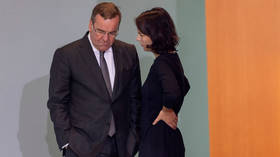German opposition leader suggests ‘mobilizing’ private savings

Germany's most senior opposition MP has suggested “mobilizing” private savings to fund public infrastructure. Friedrich Merz, the nominee for chancellor from the conservative CDU/CSU coalition, argued that such a measure would help Berlin avoid accruing more debt.
Germany’s Ministry for Economic Affairs last week released a forecast showing GDP declining by 0.2% in 2024, a sharp downgrade from the previously projected 0.3% expansion. This would mark the second straight year of recession for the EU’s economic powerhouse.
Germany’s prized industrial sector has been struggling over the past few years, owing to a combination of headwinds, such as weak demand in key export markets, a shortage of qualified workers, and the adverse effects of no longer receiving inexpensive Russian gas.
Addressing his fellow conservatives during a party convention in Augsburg last Saturday, Merz accused the current 'traffic-light' coalition government of amassing huge debts.
According to the politician, if Berlin is to kick-start the country’s economy, it should not limit itself to “looking only at the public coffers” and talking about rescinding the “debt brake.” He believes that private capital should be made available to this end as well.
Merz urged the audience to imagine if the government could “mobilize” 10% of the €2.8 billion from private accounts “at a reasonable rate” and funnel this money into public infrastructure.
“It’s not that we lack capital – what we lack are reasonable tools to mobilize this capital in such a way that it benefits the common good of our country,” Merz argued. He went on to claim that since “other countries have shown that it works,” this approach should junction just fine for Germany as well, thus saving it from taking on more debt. Merz, however, did not provide details on how the mechanism would work.
He also stressed the importance of beefing up Germany’s military, while advocating continuing support for Ukraine.
Germany is the second-biggest donor of defense aid to Ukraine, having provided over €10 billion ($11.19 billion) in equipment and weapons from January 2022 to June 2024, according to the Kiel Institute for the World Economy. Additionally, Berlin has also provided Kiev with almost $5 billion in humanitarian and financial assistance over the same period, the think tank estimates.
Chancellor Olaf Scholz has acknowledged that many Germans are unhappy about the continued aid to Ukraine.
Opposition parties such as the right-wing Alternative for Germany (AfD) and left-wing Sahra Wagenknecht Alliance have repeatedly denounced German weapons deliveries to the conflict zone, as well as the economic sanctions against Russia. They argue that the current government’s policies are hurting the German economy and could potentially lead to an all-out war between NATO and Russia.














